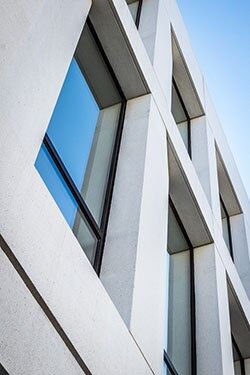
September 26, 2019
‘In case of emergency’: how smart are smart buildings?
Smart cities, smart mobility: everything seems to be smart nowadays. Our buildings too are stacked with sensors that continuously generate data. Smart building is the way to go, although no one knows exactly how smart smart buildings are. Michaël Peeters helps us to uncover the real value of smart buildings in his doctoral thesis. In order to do so, 75 students of AP University College Antwerp were dropped today in a vacant student dorm and had to find their way out of varying simulated fire situations. The million-dollar question: can smart buildings save lives?
There is no escape from big data and smart technology for the real estate industry either. However, not everyone is convinced of the added value of the often expensive 'gadgets'. And that is already part of the problem: technology is all too often seen as a 'gadget', a 'nice-to-have'. The added value is not clear, neither from a financial point of view nor from the point of view of the user.
And yet. What if you could connect various types of sensors and data generators? All of a sudden, a whole world of possibilities opens up. Sensors for power consumption, for example, may not only be useful for energy efficiency, they may also help to increase safety in buildings. These are the kind of research questions Michaël Peeters aims at answering as part of the Executive PhD program at Antwerp Management School in collaboration with the Faculty of Business & Economics and Applied Engineering of the University of Antwerp.
He looks far beyond the mere financial return and aims at mapping the total value of smart technology in the construction industry. To underpin his research, he set up a unique experiment in a vacant student dorm of the University of Antwerp, with the help of 75 undergraduate students from Energy Management and Integral Safety at AP University College Antwerp. The experiment was supported by the health & safety department and the department of infrastructure of University of Antwerp and by both the current owner of the building, the project developer LIFE, and its future operating company, LAMMP.
The students had to go one by one through various simulated emergency situations, carried out on six different yet identical floors of the building. The aim was to find out how people deal with the data they receive during an emergency and to what extent that data influences their decisions. Brent Cras and Lucas Verheusden (third-year students of the bachelor program Integral Safety) were assigned the role of observer. This type of practical research was an excellent start to the new academic year for them: "We gave our fellow students a floor plan showing the temperature per room, simulating an app that shows you the temperature, which may help you to find your way out of the building in a smart way. We timed every student and counted their steps. Thus, we were able to observe whether they were actually following the app with the floor plan or were merely acting out of habit. It's very interesting to see how the theory we discussed in class works out in real life!"

It was the very first experiment of its kind, although the need for this type of research is high, Michaël Peeters says: "Too often we lack a critical approach when handling the data (information) we receive, and we tend to jump to the wrong conclusions. Especially in emergency situations, we should be able to rely completely on the data (information) we receive. There is nothing worse than 'fake news' if you are looking for a safe way out..." Dr. Tine Compernolle (Michaël Peeters’ doctoral advisor) adds: “Thought this data holds no explicit economic value, it is still very useful. This experiment allows us to determine its implicit value, which adds an extra dimension to the total valuation of assets of 'smart' technology.”
The results of the experiment are still being processed, but Prof. Dr. Bart Cambré, Vice Dean of Antwerp Management School, is already pleased with the integrated approach: "For some, smart technology sounds like magic, while others feel like Big Brother is watching them and yet others think of it as an efficient way to make money. But above all, smart technology makes it possible to gain better insight into complex matters, which in this case can help to create a safe and healthy living environment. The unique partnership allowed us to combine scientific depth with practical applications."
For more details please contact:
Anja Tys, Corporate Marketing & Communication, anja.tys@ams.ac.be

